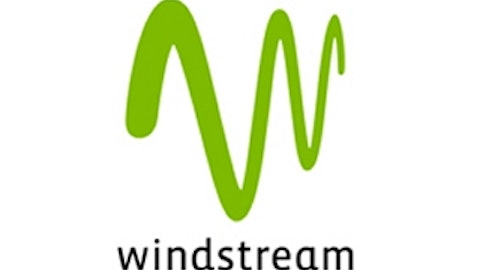
Annual revenue growth
When looking at a stock, the annual revenue increase is one of the first components I analyze. When attempting to weed out those that appear destined for failure, I still look at the annual revenue, but I make sure the company is continually experiencing a downward trend. Pitney Bowes Inc. (NYSE:PBI) has lost an average of 3% of revenue in each of the last four years. The company’s price fell by half during the recession, and it has continued to fall along with revenue. Annual revenue decreases have become a habit for this global software and hardware provider. And in the technology industry, where the titans usually come out on top, it’s easy for companies such as Pitney Bowes Inc. (NYSE:PBI) to become obsolete. The steady decline is largely attributed to weak demand for mail, as Pitney Bowes Inc. (NYSE:PBI) is largely invested in mail and document services. While the company has noted in its most recent quarterly report that demand for mail has increased, the overall trend is still bearish.
Profit margin
Unlike growth stocks, where I look for at least a 10% profit margin, a company with less than 5% should be avoided. Frontier Communications Corp (NASDAQ:FTR) has more than doubled its revenue in the last four years, but the cost of that revenue is massive. Despite going from nearly $2.1 billion in revenue in 2009 to over $5 billion in 2012, the profit margin has substantially decreased. In 2009 profit was nearly 6%, and in 2012 profits dropped to about 3%. The increased revenue could get investors overly excited about the stock, but if the company isn’t keeping costs down, trouble is on its way.
Industry
The industry of the stock is also very important in attempting to predict a company’s future performance. I am bearish on the oil sector, as I think the days of mass use of the energy source is numbered. Cleaner forms of energy are making their ways into the mainstream. If the use of cleaner forms of energy increases, it will be more difficult for small companies heavily weighted in oil to continue to profit.
Canacol Energy Ltd. (TSE:CNE) is already on its way down. The company’s share price has decreased from about $6.60 in June 2012 to its current level of around $2.60. The company has increased spending substantially over the last four years in a spend-to-survive attempt. It spent $33 million in 2009 and $155 million last year, when Canacol Energy Ltd. (TSE:CNE) finally realized a profit. Despite that profit, in the first quarter of 2013 it lost $1 million, and negative net income isn’t new for this company. In 2012’s third quarter, it lost $6 million.
Give a full analysis
While the aforementioned indicators can help you easily identify stocks in which the prices will likely drop, you should follow up with a more thorough analysis. The most recent quarterly reports and any news relating to the company can keep you updated on firms’ trends. In addition to recent reports, I like to investigate activities over the last five years, and compare any increase or decrease in revenue and profit margin. Using these three steps will narrow down the vast field of companies where you could put your money, and help you achieve investment success.
The article Improving Your Portfolio by Knowing What to Avoid originally appeared on Fool.com and is written by Phillip Woolgar.
Phillip Woolgar has no position in any stocks mentioned. The Motley Fool has no position in any of the stocks mentioned. Phillip is a member of The Motley Fool Blog Network — entries represent the personal opinion of the blogger and are not formally edited.
Copyright © 1995 – 2013 The Motley Fool, LLC. All rights reserved. The Motley Fool has a disclosure policy.




